|
Bedtime is when I feel the closest to her.
For as long as I can remember, I always feel a new burst of energy and a yearning for connection at the end of the day. Almost ceremonially and ritualistically, I peel the weighted blanket off my bed each night, fold it, and place it on my bureau, an act that always connects me to the memory of her pulling her fancy bedspread off her bed and hanging it on the blanket rack each night. Bedtime and the act of folding that blanket each night sparks something in me and my always too loud mind slows and aches for some conversation — just like we used to do during the commercials between Golden Girls, Murder She Wrote, and Dallas. She was a far better bedtime conversationalist than my snoring husband. Some nights her words come flooding back to me — telling me over and over again how smart I am, how I should be on Jeopardy someday, or how she liked my hair pulled back into a ponytail because she could see my pretty face better. I have no memories of her ever telling me she loved me but I never doubted it. I felt it. All the time. I felt it when we would sneak Milano cookies down the hallway and eat them in bed while watching tv, being careful to not let my grandfather know. I felt it when she asked me to make her some Kraft macaroni and cheese because she liked the way I made it. I felt it when she would take me out shopping all day on Saturdays and never placed restrictions on what I could order for lunch at the restaurant we would stop at on the way home. I felt it when we would sit at her kitchen table and drink hot tea and talk about the Queen, our spoons clinking loudly as we stirred in the milk and sugar. I felt it every time we were together, even if we were doing nothing — somehow especially when we were doing nothing. It’s been 25 years since I’ve seen her but I find myself feeling connected to her so very often. I feel it every time Milano cookies find their way into my shopping cart and I get to enjoy them with my sons. I feel it every time I open a box of Kraft macaroni and cheese for my son, my niece, or my nephew. I feel it every time I catch a glimpse of myself with my hair pulled back in a pony tail. I feel it every time I get to watch Jeopardy or see a reference to The Golden Girls. I feel it every time I sit and enjoy a good cup of tea or when I watch The Crown. Some nights after I pull back that weighted blanket, when my mind begins to wander, wondering what kind of mother, wife, and friend I was that day, I find comfort in the lessons of love my grandmother taught me. I don’t need to plan big trips, be a perfect person, spend lots of money, or create elaborate memories in order for my children to know that I love them. The truth is that the things that fill our hearts when we lose the people we love are the little moments. The mundane, simple, and ordinary moments are what keep us connected to them and make us feel their presence long after they have left this world. The little things are what remind us we were loved. ****** originally published on Her View From Home, March 2021.
0 Comments
It’s here.
That painful time of year has arrived. Despite the festive red cups at the coffee shops, the pretty twinkling lights everywhere, and the bright and cheerful holiday music, this time of year is excruciatingly painful for so many. They walk amongst you. They plaster on their fake smiles during work Zoom calls. They sit beside you making small talk at your kid’s basketball games. They chat about surface level topics over dinner at birthday parties. They stand quietly in line while waiting for their latte, willing back their tears. They pluck ornaments from the giving tree at the gym, desperate to find a way to find a glimmer of happiness right now. They are heartbroken. They are all too aware of the giant hole in their lives during the holiday season. The thought of not seeing their loved one at the holiday table makes them want to faint or scream or punch the wall or hide under the covers for days. They are all around you. And they are often silent. So silent. But if you listen, their silence is deafening. Society doesn’t grant them much permission to share their grief, to talk about their loved one, or to express their complicated feelings. After all, the holidays should be a joyful time and there’s always something to be thankful for. At least, that’s the message we send to them. “Be happy.” “Get over it.” “They wouldn’t want you to be sad during the holidays.” But when you are grieving, nothing is more lonely or less joyful than the holiday season - two long months of pure emotional pain and social pressures. So they push their pain down and carry on, pretending to be whole. But they aren’t. They are hurting. They are broken. Next time you are in your Zoom meeting, or at your kid’s basketball game, or at a gathering with friends, or in line at the coffee shop, take a moment and forget about festive cups, twinkly lights, and holiday music and listen. Listen to their silence. Look behind their fake smiles. Hear their hidden pain. Feel the silent weight they carry. Maybe you could even give them space to grieve, ask about their loved one, or just let them know you see them. They need it. Especially now. It’s here. ****** Download your free 7-page grief journal abs guide here: bit.ly/Griefjournalguide ***** That time of year has found us once again.
Everywhere we turn we see the sights, sounds, and smells of the holidays. Stores fill their aisles with holiday decorations and pine tree scents. Dunkin’ Donuts and Starbucks rolled out their festive holiday cups. Radio stations have been playing holiday tunes for weeks now. Social media is filled with posts of families posing for their holiday greeting cards in fields filled with Christmas trees. After everything this year has brought us, we can all breathe a sigh of relief and lean into the holidays. Right? Wrong. For so many of us, these winter holidays are hard and nothing short of heartbreaking. This time of year, more than any other time of year, is when all the wounds of grief start to open up, memories flood to the surface of grievers’ minds, and the pain of losing someone we love is more palpable than ever. Everywhere they turn, people who have lost loved ones are reminded those special people will not be with them this holiday season. There will be no gifts for them. They will not be seated at their holiday tables. They will not make their famous apple pies or green bean casseroles. They won’t participate in their family’s matching pajamas traditions. They won’t be there to help wrap presents or sign holiday cards. Death has left an unimaginable hole in their lives and the holiday season amplifies it almost infinitely. You probably know people who are hurting like this right now. They are your friends, your family members, your co-workers, and your neighbors. Maybe you are the person who is hurting right now. Maybe it’s all you can do to hold on each day as these cold, long nights and holiday cheer all around create a deep, dark sadness for you. My friend, keep holding on. You will make it through these hard days. These challenging times can be made a little less painful by leaning into a few core truths. It’s OK To Include Your Loved One in the Holidays So often our society sends us subtle (and sometimes not so subtle) messages to find closure, let go, or move on following a loss. To put it nicely — that’s a bunch of nonsense. You don’t need to let go of your loved one after their death. You should find new ways to hold onto them, treasure your memories of them, and find new ways to feel connected to them. It is OK to find a way to honor your loved one and include their memory in your holiday season. Perhaps there is a special ornament to hang on your tree or you can light a candle each night in their memory. Maybe you could volunteer to feed the homeless, sponsor a family in need, or host a toy drive. Cook that favorite dish of theirs. Wear those earrings they gave you. Don’t try to forget them this season. Instead, remember them. Talk about them. Share their memory with others. Feeling Your Feelings is Normal and Healthy This time of year, more than any other time of year, can make those of us who are grieving feel like we are on an emotional roller coaster. Suddenly that sweet little Santa figurine that used to make us smile sends us into a fit of sobbing. That Christmas movie we always used to love suddenly makes us feel angry and jealous. These feelings are normal. There is nothing wrong with you — you are grieving. If you need to cry, cry. If you need to express some anger, take up kickboxing or scream into a pillow. Seriously. Let out your emotions. If you try to bottle up all of your feelings, they probably will escape at the most inopportune times — like when your child spills his glass of apple juice, someone cuts you off on the highway, or that lady in front of you tries to sneak 13 items into the 12 items or less express-line at the grocery store. Reaching Out To Your Support Network is Not a Sign of Weakness For many people, their support networks kick into hyper-drive following a loss. Phone calls, texts, visits, casseroles, and cards pour in almost non-stop immediately following the death. But after the funeral, those types of support can suddenly come to a crashing halt. Do people suddenly stop caring? No. Many people are uncomfortable around grief and simply don’t know what to say, what to do, or how to act. So, they avoid it. Don’t be afraid to tell your support network what you need. It’s OK to ask for specific things like invitations to social events, regular phone calls, a visit, staying away for a while, and even practical help with things like errands and child care. In most cases, your support network will be delighted to have been given a specific way to be useful and supportive for you. You Must Be Kind To Yourself Check yourself right now. Do you have some negative self-talk swirling around in your brain? Are you judging yourself for what you are feeling and how you are expressing those feelings? Be kind and understanding to yourself. Grief doesn’t go away. It’s always there inside you. You carry it around with you and sometimes it’s heavier than other times. It’s normal, and it’s OK to struggle with the weight of that grief. Recognize that it is normal for this time of year to be more painful and challenging. This is a good time of year to try to look for the things and people that bring you hope. Do things that make you feel good and nurture yourself. Yoga. Walk. Exercise. Journal. Read. Play music. Listen to music. Start therapy. Attend a support group. Above all, remember you are human and deserve compassion — especially from yourself. This piece was originally published 12/10/2020 on Her View From Home: https://herviewfromhome.com/4-ways-to-get-through-the-holidays/ You Need This FREE Grief Journal & Guide If...
Click HERE to learn more and download your free copy today. Get My Free Grief Journal & Guide Bedtime is what I feel the closest to her.
For as long as I can remember, I always feel a new burst of energy and a yearning for connection at the end of the day. Almost ceremonially and ritualistically, I peel the weighted blanket off my bed each night, fold it, and place it on my bureau--an act that always connects me to the memory of her pulling her fancy bedspread off her bed and hanging it on the blanket rack each night. Originally published on Her View From Home. Click HERE to read the full article. This morning as I scrolled through social media, I saw multiple sites sharing the news of Chrissy Teigen’s and John Legend’s “pregnancy loss.” There was comment after comment and judgment after judgment about how they were wrong to be sharing something so “personal” with others and how they were selfish to take and post photos of themselves grieving with their baby.
Those attitudes, those statements, and those judgments are exactly what is wrong with our society and our understanding of grief. Can we please stop minimizing the pain felt from a miscarriage and infant loss? Can we please give space for people to grieve openly about it? Can we please stop sanitizing death, grief, and sadness to make it more palatable for others? Can we please stop denying that the death that Chrissy and John just experienced is something that couples across the world face every single day? Something awful has happened. A parent’s worst nightmare has come true. Their baby died. The baby they named, felt move, dreamed about, envisioned a future for, and talked about with their other children has died. It is real. It is grief. They are allowed to talk about it and express it — yes, even publicly and yes, even though it is difficult to see. When someone, celebrity or not, loses an aging parent we don’t say they should keep it quiet or private. We don’t balk at them for sharing photos. We don’t mock them for their sadness or grief. We don’t minimize their pain. Why can’t we show that same grace to couples after they lose a child? The answer is simple — because such a loss isn’t supposed to happen. We don’t want to think about it. We don’t want it to be real. We don’t want to bear witness to such pain. But, we need to do just that. Grief is grief. Loss is loss Death is death These are the things that remind us we all are the same — celebrity or not, rich or poor — we all lose someone close to us at some point and for a lot of people, that someone close is a child, an infant, or a baby that never gets to live outside of the body. Please, before you roll your eyes or say “Ew. Keep that private” consider the people around you — your friends, your family, your neighbors, your colleagues. I promise there are people in your life right now who have experienced similar loss and have kept their pain inside because people have told them sadness like this must be kept a secret. I sit with those people in my grief sessions and see the impact that the inability to grieve openly has on them. We need to do better for them. My heart breaks for Chrissy and John and every other parent that has felt what they are feeling right now — and there are a lot of them out there. I am so thankful to them for being willing to be brave in their pain and to demand space for their open grief. I hope that some day we all can afford all grievers that same kind of space — the space they need and deserve. “Can I ask you a random question?”
A question like this at the end of a therapy session is always enough to make a therapist’s heart stop. But today’s question was one that is probably on the minds of many people out there. “My friend just had a death in the family and I want to do something for him. Is it appropriate for me to bring him a donut from his favorite bakery?” First of all, I’d be hard pressed to find a time in which is wasn’t appropriate to bring someone a donut from their favorite bakery but that’s not the question right now. Second, of all. “Yes. Yes. One thousand times yes. Bring the donut. Always.” The most important thing any of us can do when someone we love is grieving is show up. Call them. Text them. Bring them donuts. Bring them dinner. Sit with them in silence. Sit with them and talk. Sit with them and cry. Sit with them and laugh. It doesn’t matter what you do so long as you sit with them in their grief and let them feel heard and seen. If you are questioning whether bringing your grieving friend a donut is appropriate, go get one right now. You won’t regret showing up for them and it will likely mean the world to your friend. If you have a friend who experienced a loss a few months ago or the anniversary of that loss is coming up, now is probably a great time to bring them a donut too. Lots of people show up in the beginning following a loss but then the world moves on, often leaving the griever behind. Chances are that you’ve got people out there that you care about, right now, who are grieving alone and in silence. Bring them the donut. Always. As I sat at my desk during my 10 minute break between grief therapy clients, I opened my Facebook app to scroll mindlessly for a few moments, completely unaware that my life was about to change.
A photo of one of my friends filled my feed instantly. It was a beautiful photo of her, one that captured her love for all people and her genuine desire to make life better for everyone. I skimmed the headline beneath the photo quickly and my brain couldn’t compute what I was seeing. The gruesome, horrific, unreal words didn’t match the photo before me of the carefree young woman that danced the night away at my wedding or led classrooms full of preschoolers in silly songs alongside me. It couldn’t be. With a shaking finger, I clicked on the link and my brain was finally able to make the connection. We failed her. The society she worked so hard to make better had failed her, letting her and her daughter die a horrible death at the hands of the man that was supposed to love them most. It’s a fate shared by many women and now she was part of the startling statistic of women whose desire to leave their partner led to their own murders. Tears spilled freely from me in that moment. I’m not so sure she ever really knew how much her role as a mentor had meant to me or how much it had changed the course of my personal and professional life. I don’t know that I ever really told her how much I had learned from her and how much I always wished I had the courage to commit my life to making the kind of global changes that she so selflessly has made. I hope she knew how much of a ripple she had left in my life but I can never know for sure. Now it’s too late. She’s gone. Nausea swept over me and I broke out into a cold sweat as my brain began to process the terror she must have felt in her final days, final hours, and final moments as she realized she had no way to escape. As dark as it was, I wanted to stay in the moment of grief, that space of remembering her, but the clock kept ticking and in just a minute I was due to provide grief therapy to another patient. I quickly pulled myself together, fixed my face, and pushed my emotions into a far off corner in my mind so that I could hold space for someone else’s grief, hoping that I would be able to process all of my feelings later on. After leaving work that day, I briefly exchanged text messages about the awful story with some of my closest friends and shared a Facebook post not about the manner of her death but about her contributions to the world, as if somehow disconnecting the photo of her beautiful face from the horrible headline could alter reality. Then I went about my night. I sat at a friend’s kitchen counter with other moms, making decorations for a youth football championship game while chitchatting about mundane stuff. My brain both craved this simple, unemotional task and yet also wanted to reject it. I wanted to set the football decorations aside and share her legacy with everyone. I wanted to tell them about her, her work, the sheer number of lives she changed, and my memories of her from such a pivotal time in my life. But no one wants to talk about sadness or grief or loss or death. So, I didn’t bring it up and neither did any of the people there with me. Collectively and silently we somehow agreed to pretend it hadn’t happened. We minimized the reality of her death and ultimately minimized her and her life. I moved through the space of the next few days in a deeply contemplative state, as one often does when the unexpected and terrible occurs in life. Suddenly things that seemed incredibly important paled in comparison to what my friend had gone through; what her family and community were going through. My own priorities snapped into focus. Life is far too short for many of us and tomorrow is not a guarantee. So, why waste any of it on the things and the people that hurt you or don’t make your life better? What is going to matter most at the end of my own life? What will my legacy be? Do the people who matter to me know how much they matter? After a loss or trauma, the world marches on, leaving the grievers behind to pick up their own pieces, or to at least pretend they are picking up their own pieces. But, inside there is a constant loop of questions being asked and a deep yearning to be given permission to talk about their grief. The reality is that we are surrounded by hurting people all the time; people who want to talk about the sad stuff. They want us to ask them about their dead child, their murdered friend, their dying grandparent, or the struggles of waiting to find out if their biopsy is cancerous. They are craving permission to share their inner struggles about trying to find a way to make sense of the saddest parts of our lives. But, instead we throw ourselves into the things that don’t matter: small town politics, conflict in surface-level friendships, baskets of laundry that are overflowing, traffic that adds 15 minutes to our commute, gossip, drama, nonsense. At the end of our lives, none of it will matter. Imagine how much more beautiful this life could be if we all were just a little more real with each other. Imagine the benefits to being just a bit more vulnerable. What would it be like if we all focused more on real connections and sloughed off the stuff that won’t matter when we are at the end of our own lives? I wonder if the outcome would have been different if more people had done this for my friend. Perhaps it wouldn’t have changed what happened to her but maybe, just maybe, it would have given her a few extra moments of hope, comfort, and validation. We have work to do. After spending nearly a year producing podcasts on topics including grief, parenting, health and wellness, relationships, and pop culture, it can be a bit of a challenge to find the episodes that are most meaningful and useful to you. We want to make it easy for you to find the resources you are looking for without having to spend time searching and filtering.
Here are 11 of our most popular Grief Podcast Episodes:
It’s that time of year again.
All around us are the sights, sounds and smells of the holidays. Stores are beginning to fill their aisles with holiday decorations and pine tree scents. Soon Dunkin Donuts and Starbucks will roll out their festive holiday cups and radio stations will begin playing the first notes of holiday music. Before we know it, Santa will be arriving in locations all around us to pose for photos with children. Already families can be seen in local parks and pretty fields taking their annual family portraits for their Christmas cards. Restaurants are advertising their holiday meal order schedules and holiday party invites have already made it to some people's inboxes. Such a wonderful and joyous time of the year. Right? Not for everyone. For many people, the winter holidays are excruciatingly painful. Either they have recently lost a loved one and this will be their first holiday season without them or the holiday season is a sad reminder of their lost loved one. When they see all the happy, smiling faces on Christmas cards, they are reminded that their loved one won’t be on any cards this season. That adorable, heart-warming commercial with the cheerful family seated around the Thanksgiving dinner table makes them realize there will be an empty chair at their own Thanksgiving table this year. While perusing their local Target, a holiday sale banner catches their eye and they see “the” perfect gift for their loved one, forgetting for just a split second that there will be no gift exchange with their lost loved one this year. Maybe you know these people. You probably do. Think about your friends, your family, your coworkers. How many of them lost someone within the past year? How many lost a very important person ever and might ache for them throughout the holiday season? Maybe this person is you and you find yourself dreading the holiday season. For those of us living in parts of the country where the sun sets earlier, leaving us in darkness from 4:30pm on, the nights can start to feel painfully long and lonely this time of year. The colder weather forces us indoors, encouraging us to hibernate. But if you have recently lost a loved one, the longer nights, colder temperatures, and holidays on the horizon can all add up to a deep, dark sadness. Whether you are the one hurting this holiday season or you know someone for whom the holidays are difficult, here are some tips to help you manage the grief that is often so palpable this time of year. 1. Honor your loved one So often our society pressures us to “move on,” “heal,” “find closure,” or “let go” of our loved ones. Those messages are wrong. We shouldn’t be letting go; we should be finding new ways to hold on to them, hold onto our memories of them, and find a new way to feel connected to them. Spend some time thinking about how best to honor your loved one this season. It could be as simple as lighting a candle or hanging a special ornament on your tree. Maybe it’s volunteering to feed the homeless, host a toy drive for children, or sponsoring a family for Christmas. Go to their favorite restaurant. Cook their famous side dish. Wear their necklace. Stop trying to forget them. Instead, embrace your memories of them. Talk about them. Say their name and say it often. 2. Allow yourself to feel It’s amazing how connected our senses are to our emotions. Just a certain smell in the air or a song on the radio can take us back to another time in our life. The holidays can do this too. Don’t be surprised if you find yourself more emotional than usual. If you need to cry, cry. If you you need to express some anger, take up kickboxing or scream into a pillow. Seriously. Let out your emotions. If you try to bottle up all of your feelings, they probably will escape at the most inopportune times — like when your child spills his glass of apple juice, someone cuts you off on the highway, or that lady in front of you tries to sneak 13 items into the 12 item or less express line at the grocery store. Feeling all of your emotions doesn’t make you weak; it makes you human. 3. Be social…or don’t It’s normal to not want to celebrate at all during the holidays after a loss. Seeing so many people laughing and filled with joy can feel surreal when your world is still spinning uncontrollably after a loss. If you don’t want to attend some of the holiday functions, don’t. You know yourself best. One word of caution, however: isolation after a loss can lead to depression and complicated grief. Sometimes it’s good to force yourself to socialize, just a little. When you do accept an invitation somewhere, though, give yourself an escape route to use if things suddenly feel too much. Give one or two friends that will be at these events a heads up that you may need to quickly duck out. This little bit of planning means that you are giving yourself permission to leave whenever you need to leave, without having to worry about explaining your quick departure to anyone. 4. Speak up For many people, their support networks kick into hyper-drive following a loss. Phone calls, texts, visits, casseroles, and cards are pouring in almost non-stop immediately following the death. But after the funeral, those types of support can suddenly come to a crashing halt. Do people suddenly stop caring? No. Many people are uncomfortable around grief and simply don’t know what to say, what to do or how to act. So, they avoid. Don’t be afraid to tell your support network what you need. It’s ok to ask for specific things like invitations to social events, regular phone calls, a visit, staying away for a while, and even practical help with things like errands and child care. In most cases, your support network will be delighted to have been given a specific way to be useful and supportive for you. 5. Be kind to yourself Watch for negative self-talk and talking down about yourself. Thinking or saying things like these ones only bring us down more: “I shouldn’t be crying like this.” “This shouldn’t bother me so much.” “What’s wrong with me” Be kind and understanding to yourself. Grief doesn’t go away. It’s always there inside you. You carry it around with you and sometimes it’s heavier than other times. It’s normal and it’s ok. Recognize that it is normal for this time of year to be more painful and challenging. This is a good time of year to try to look for the things and people that bring you hope. Do things that make you feel good and nurture yourself. Yoga. Walk. Exercise. Journal. Read. Play music. Listen to music. Start therapy. Attend a support group. Remember that you are human and deserve compassion — especially from yourself. |
GriefGrief is everywhere for all of us - yet our society does a poor job allowing people to grieve. It is ok to grieve and it is normal to struggle with how to continue living your life while dealing with grief. Archives
June 2023
Categories
All
|
Sign Up For the Changing Perspectives Newsletter
Changing Perspectives with Jenni Brennan is supported by its audience.
When you purchase through links on this site, an affiliate commission may be earned. Learn More.
When you purchase through links on this site, an affiliate commission may be earned. Learn More.
Changing Perspectives Copyright © 2023
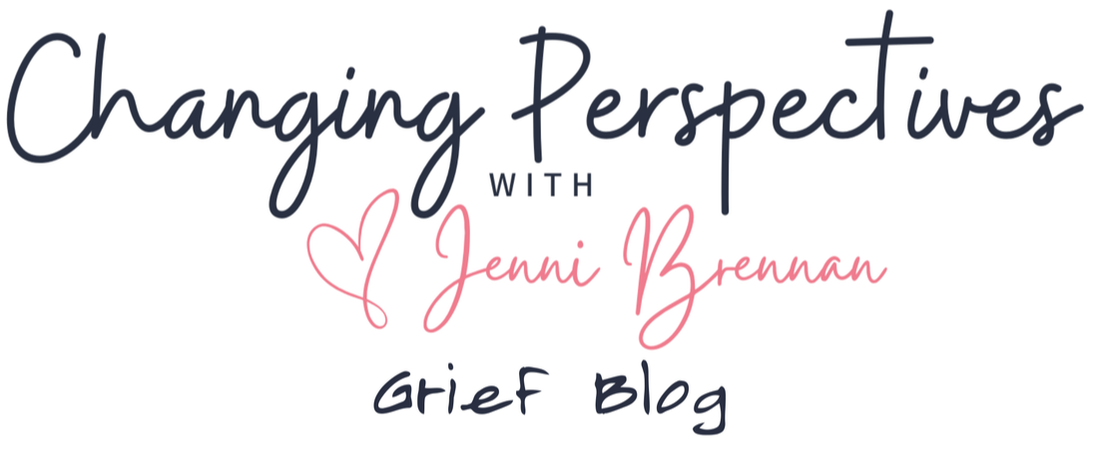
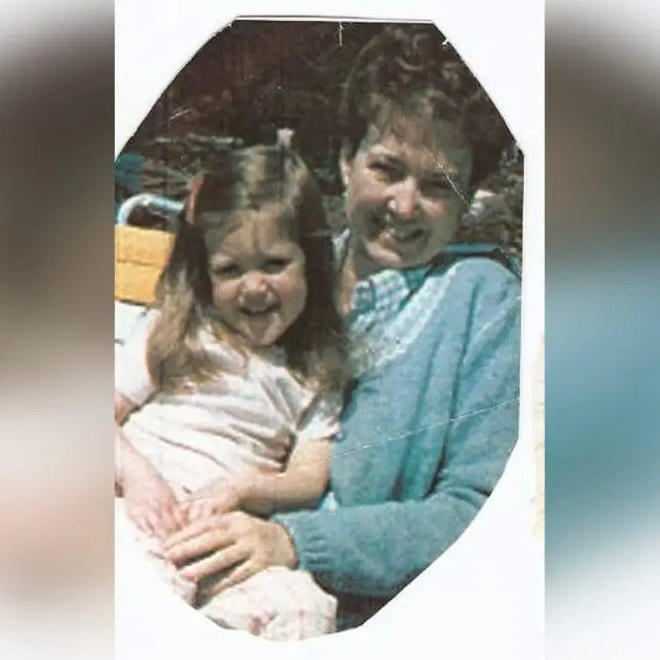
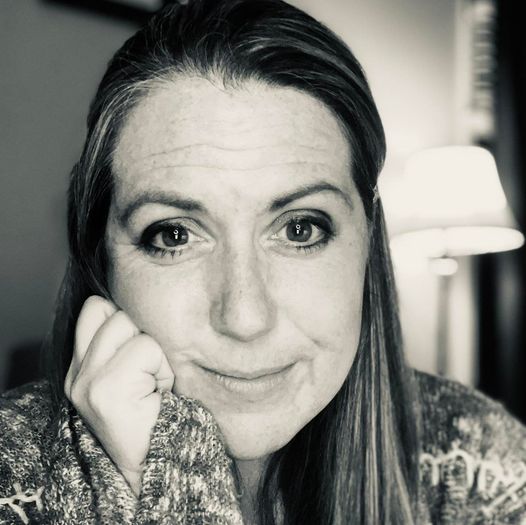

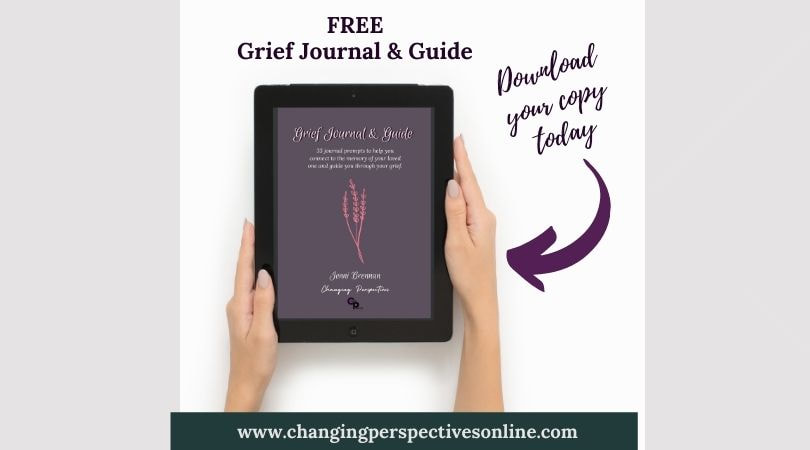
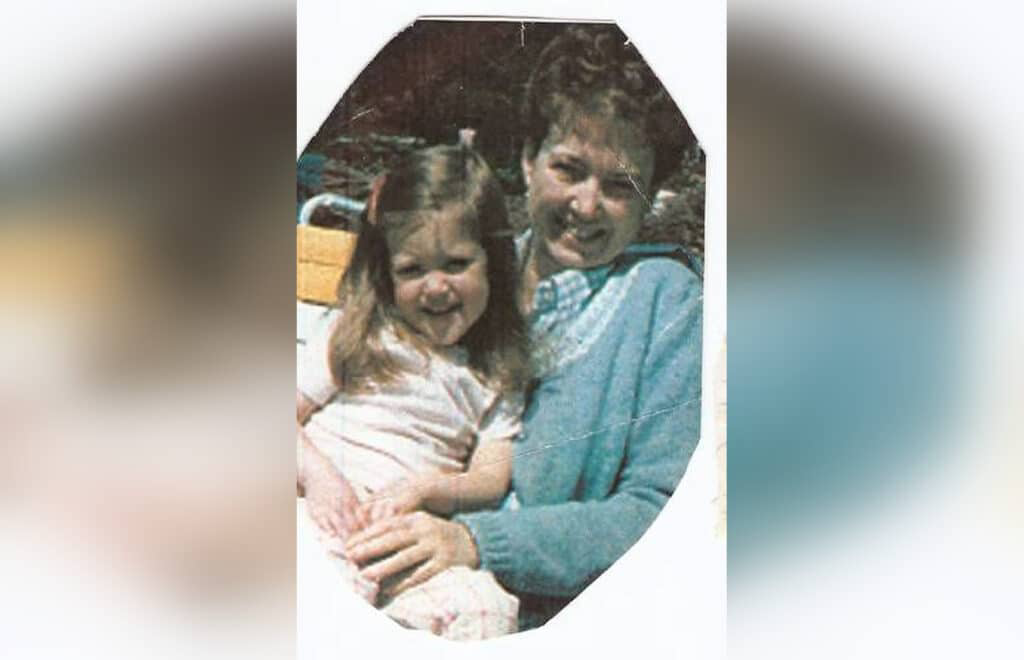

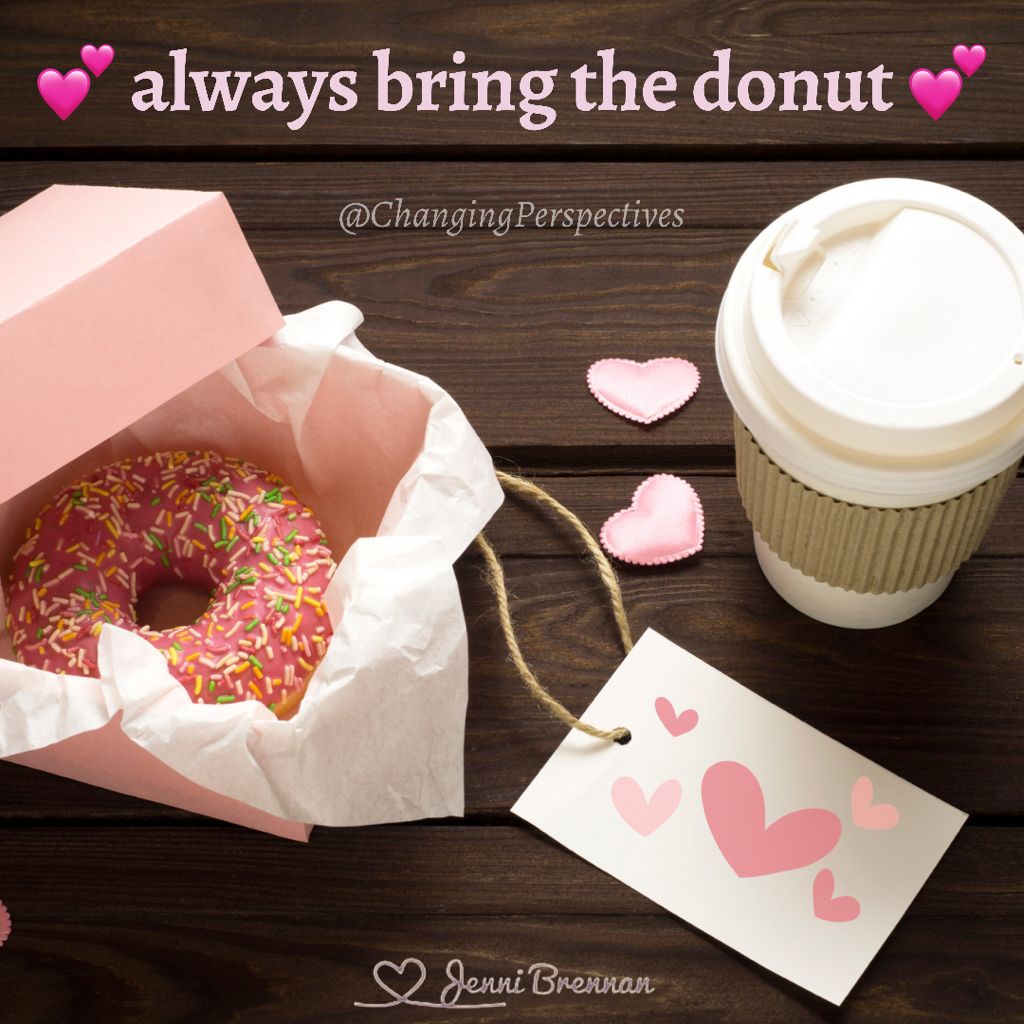
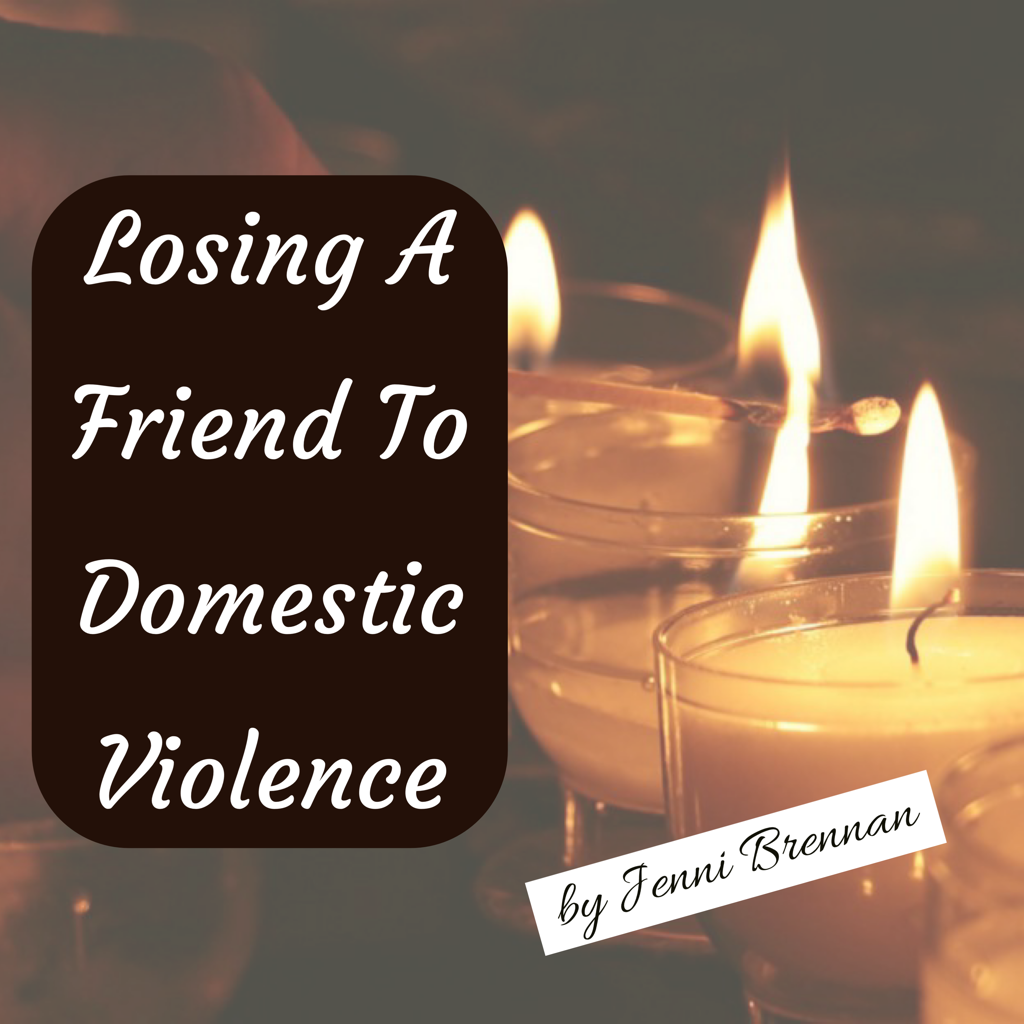
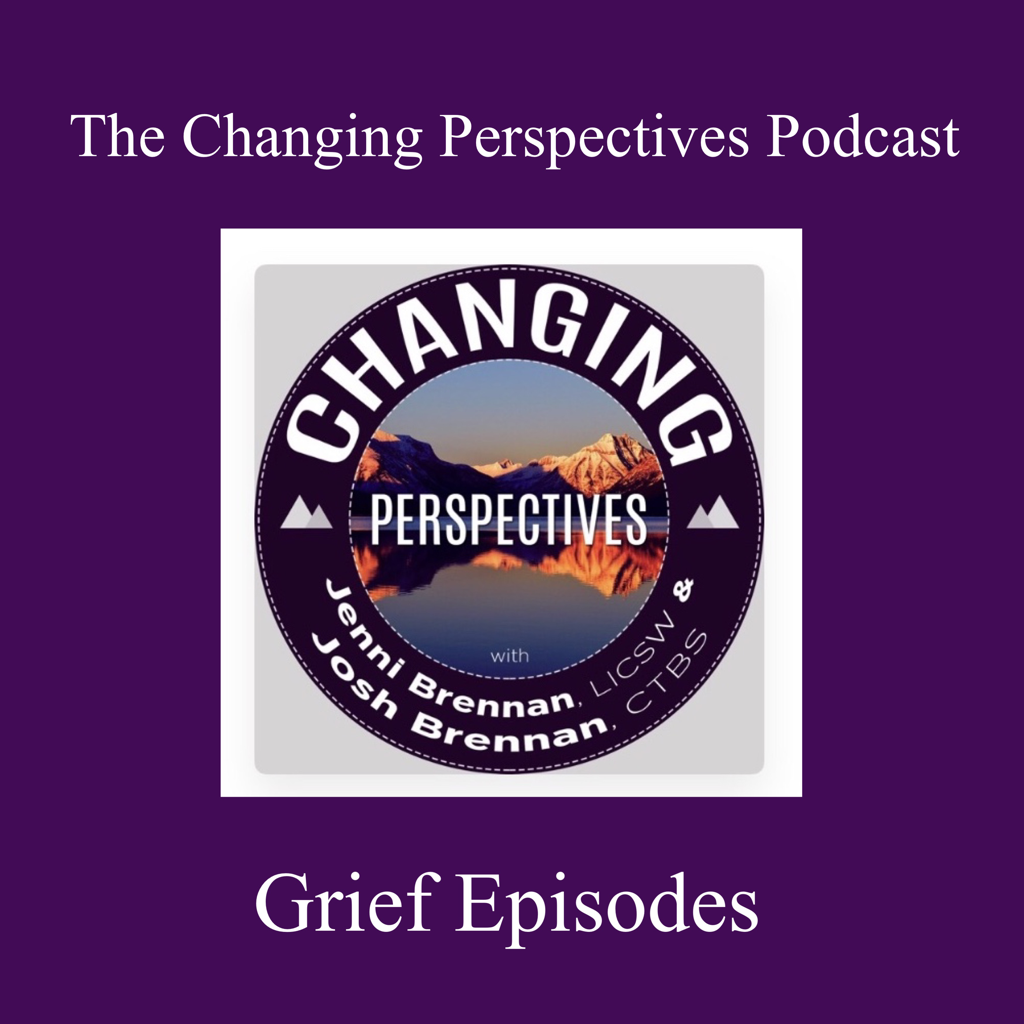
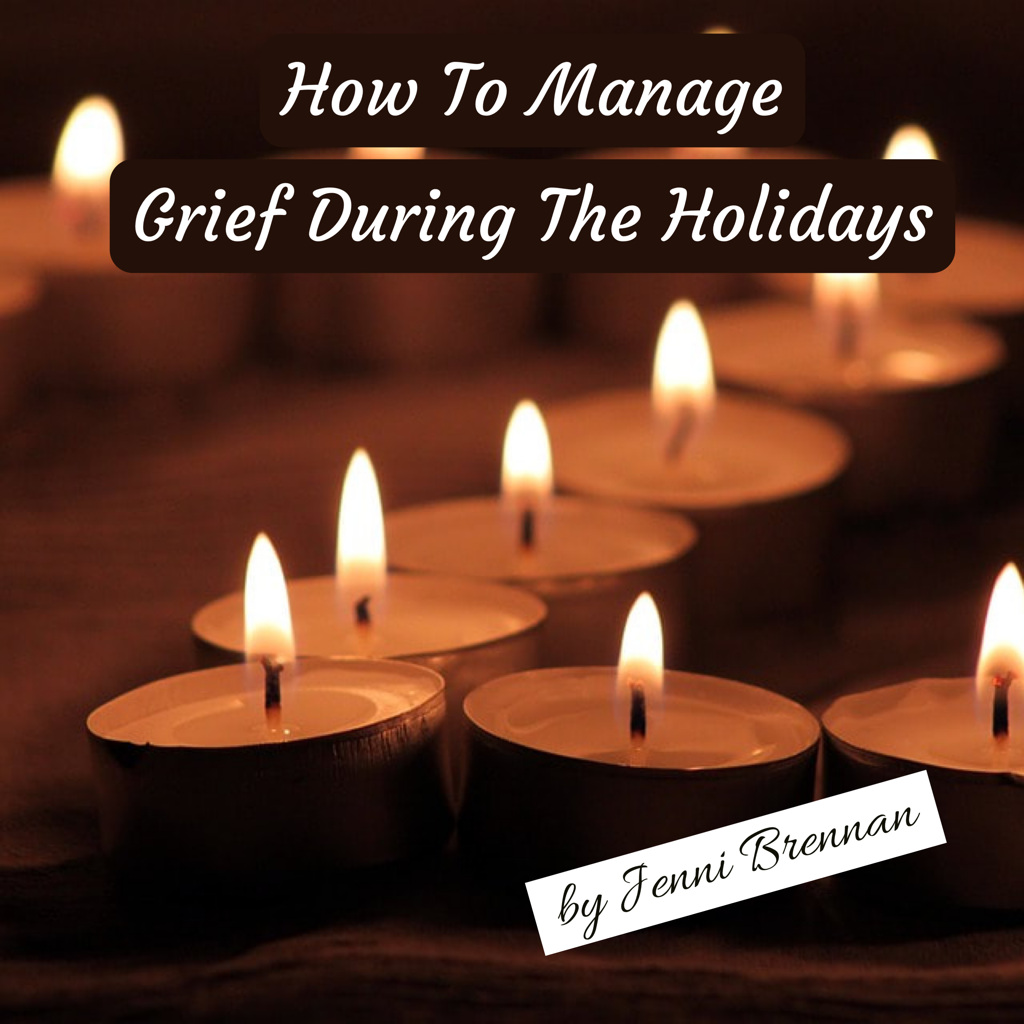
 RSS Feed
RSS Feed
